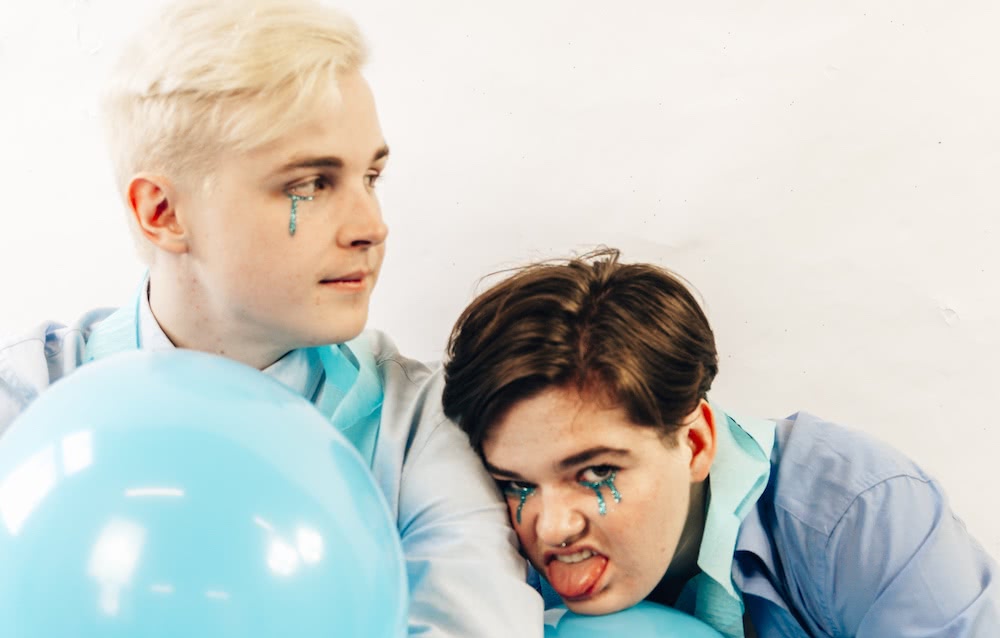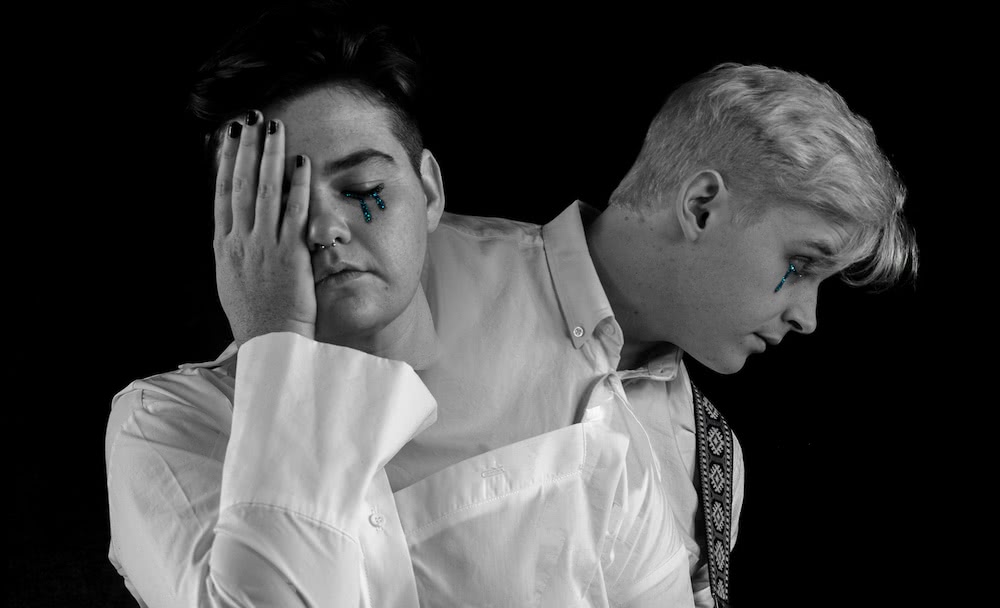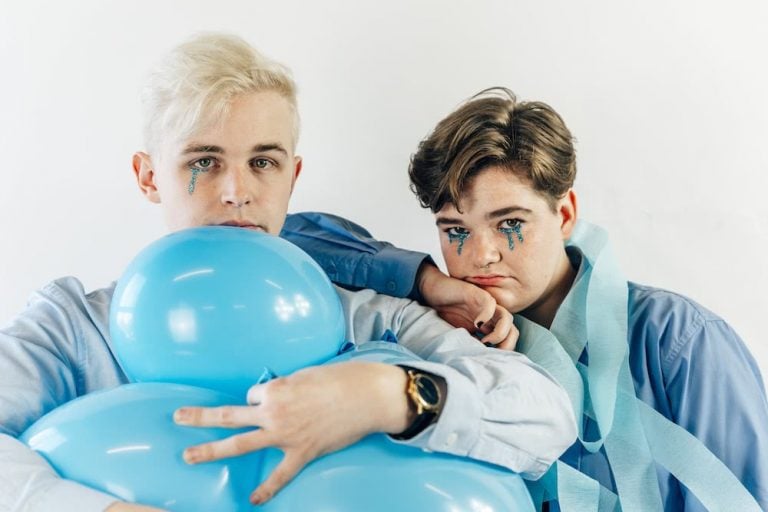Wollongong two-piece Cry Club combine two genres that rarely meet eye-to-eye: in their sound you can hear post-punk’s dissonant, propulsive energy melting into pop’s tender yet strong vocals and catchy hooks.
The duo share an affinity for music that’s as danceable as it is sad. “I think of LCD Soundsystem,” says guitarist Jonathan Tooke. “One of my favourite lyrics ever is in ‘Drunk Girls’. It’s a song about partying and stuff and there’s a line that’s like, ‘Love is an astronaut / it comes back but it’s never the same’.”
Vocalist Heather Riley responds, “Ouch,” and Tooke erupts in giggles.
In their teenhood, Riley and Tooke repressed their desire to listen to pop music. “As I’ve grown as a music listener, I’ve become aware of the gatekeeping behaviour of my teenage self and others within post-punk circles by thinking that if something was pop at all it held less value somehow, which is something I firmly disagree with now,” explains Tooke.
I get turned off by that snobby attitude that it can’t be accessible or it’s worthless.
Riley agrees. While they felt less pressure to be “perfect and marketable” in post-punk scenes, Riley was dissatisfied with the way people would de-legitimatise pop and its fans.
“It’s just such a shame that a large part of that community label pop music as less sophisticated and not as valuable as what they like – and let’s face it, it usually comes down to misogyny,” they say. “I’ve always loved guitar-driven music, but I get turned off by that snobby attitude that it can’t be accessible or it’s worthless.”
Love Music?
Get your daily dose of metal, rock, indie, pop, and everything else in between.
But the commercial world of pop doesn’t come without its own trials. “Why can’t a pop musician be non-binary [in gender], dirty, raw and in-ya-face? I’ve always loved a good pretty-ugly contrast,” Riley says.

And this is where Cry Club are bridging the gap. “It’s there in our visuals with the glitter and sweat and in the music with these gorgeous catchy melodic lines [that are placed] over dissonant instrumentation,” Riley notes.
Riley started acting from the age of five and started singing lessons a few years later, which eventually led them to government programs like the Talent Development Project. “They were just soul sucking. Like, the TDP, they run School Spectacular. They’d kick people out and be like, ‘You need to lose weight,’ ‘You need to cut your hair,’ ‘You need to do change this about yourself.’ It was a very industry industry,” they say.
Why can’t a pop musician be non-binary, dirty, raw and in-ya-face?
“They told me, ‘You’re not a good songwriter, but you’re also not a good dancer so you can’t do musical theatre. You can’t write your own songs, so you’re just going to be a cover artist.’
“And I was like,” – Riley makes an uncomfortable squeal – “‘okay!’ It’s somewhat shocking to hear this from a vocalist and songwriter who I’ve seen blow away audiences, but perhaps it’s understandable: music programs aimed at adolescents often push for perfectionism – and being pressured to reach for the unattainable leaves a mark.
“That’s why I get so anxious doing Cry Club stuff, because I honestly can’t tell when stuff is good or not – I just assume it’s bad,” they say. “It’s taken me a long time to get over that. I’m still not over it, but I’ll get there.”
As for Tooke, he’s currently a guitar teacher, a sound engineer and plays in not one, but five Wollongong-centric bands, which range from the soft indie-rock of Jack R. Reilly to the very silly math-rock of Basil’s Kite.

Tooke first picked up a guitar at 14; considering his musical history and the fact he seems to be constantly producing the records of everyone I’ve ever met (including my own band), I’m almost shocked to learn he didn’t shoot out of the womb and bounce straight into a studio.
“I didn’t grow up with music like, at all,” he says. “The point at which I clocked over to like, ‘music’s cool’ was the soundtracks to video games,” – in particular, Burnout Three.
While Wollongong has a community-minded, supportive attitude towards its artists, and its scenes are constantly growing in diversity, Tooke also says, “Wollongong has for a long time been a very rock and roll kind of boys club. There’s a bunch of people I know who would be way more into going to gigs if wasn’t just that.”
We recently went to see a sold-out Raave Tapes show at Rad Bar on Kembla Street and dug the fact that vocalist Joab Eastley asks punters to look out for one another during their set. “It was good seeing Raave Tapes putting a lot of effort into making sure those spaces are safe, whereas other bands that I’ve seen at Rad deliberately thrive in the fact that it’s a dangerous thing, which pushes anyone who’s not ready for a rough and tumble out of the space.”
The growing enthusiasm among bands to create spaces where punters feel looked out for is something Riley and Tooke want to champion for their own shows.
Asked what they like most about crying, Riley replies, “It’s extremely portable: you can cry anywhere.” On a trip to Japan, the two bonded over shared spilt tears for the finale of Cartoon Network’s obscure fantasy series Over The Garden Wall. In the past people invalidated Riley for crying, but now they know it’s just a necessary emotional release. “Cry Club really fit in terms of owning these parts of me and inviting others to do the same,” says Riley.
While crying isn’t off limits at their shows, you’re not in for a mopey performance. You can often catch Riley doing furious air kicks while Tooke bops around the stage. “People are always like, ‘Wow, you guys really go for it!’ What else would you do?” he says.
And Riley explains, “I love being very physical. I’m like, ‘Get on the fucking ground, roll around – you can be weird, it’s okay!’”
Cry Club’s debut single ‘Walk Away’ is out independently on Tuesday, July 3.

































